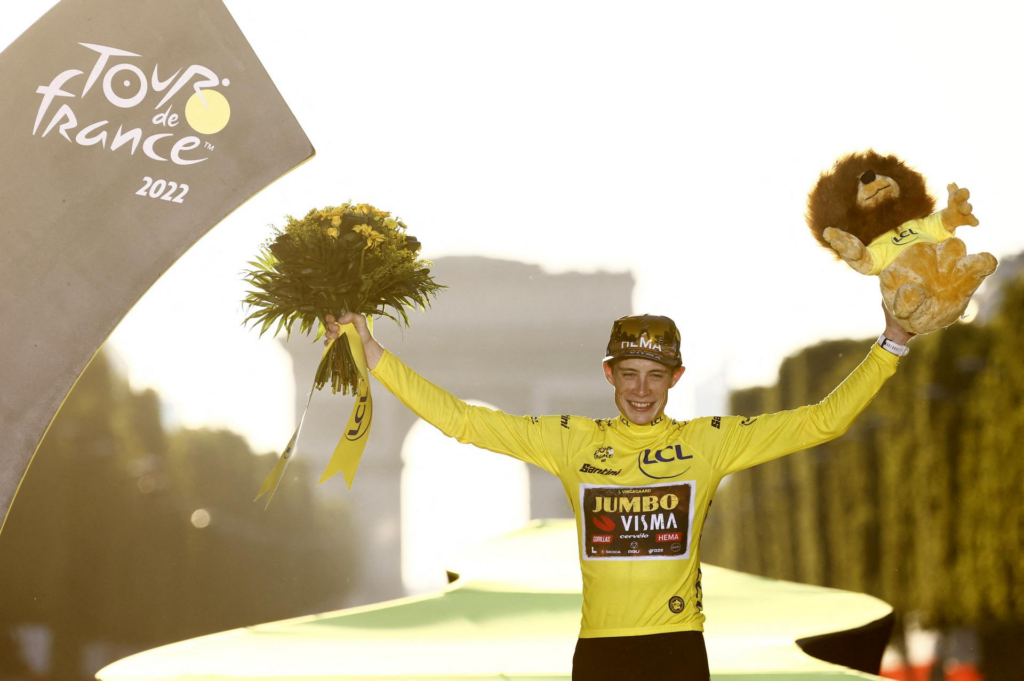Do you ever think about where you would go if you could time travel?
I’m sure you have something in mind, but today we’re time traveling back to the 1900s in France.
This isn’t just your run of the mill type Marketing story, this is one that still has a profound impact on global culture today. Let me set the scene for you.
You’ve just been hired by the local newspaper, you’re fresh out of school, you eat baguettes for breakfast (count me INNN), and thoroughly enjoy sipping coffee at the local cafe…

(This is a picture of me trying to look cooler than my brother-in-law who bikes frequently)
There are a few prominent newspapers in France, but none hold the status of Le Velo. France’s premier sports and politics newspaper, the best writing talents were always in the columns at Le Velo.
One of these talents, Henri Desgrange, often wrote pieces about physical education and the importance of sports in Le Velo.
But when disputes between advertisers and Le Velo arose, advertisers quickly sought out Desgrange. Not interested in supporting Le Velo anymore, these advertisers pitched the idea of a new sports daily newspaper to compete with Le Velo, wanting Desgrange to take the lead.
So they offered Desgrange the position of editor-in-chief of L’Auto, a fresh take on newspapers, and he accepted.
(Henri is pictured below.)

Releasing their first issue on October 16th, 1900, L’Auto took a contrary position to many other newspapers at the time, avoiding writing about political issues.
A sports-dedicated newspaper is what L’Auto embodied. This gave them an initial point of differentiation in the market, but soon they were getting swallowed up by the competition, struggling to grow.
Desgrange and L’Auto began to look for other ways to build their subscriber base and get the newspaper in new hands.
At the time their biggest competitors were sponsoring sporting events, doing exclusive interviews with athletes and coverage of the results.
Their competitors were seeing some success.

That’s when Geo Lefevre, a 26-year-old writer who covered rugby and cycling had an idea. (Desgrange hired Geo from Le Velo.) What if L’Auto sponsored their own sporting event but took it to the next level?
Level up your marketing game
Zero BS. Just fun, unfiltered, industry insights with the game-changers behind some of the coolest companies from around the globe.
No spam. Unsubscribe any time.
Their competitors were sponsoring one-day cycling races, and it just made sense. Logistics were easy, the races took place on public roads, and attracted all sorts of sports fans, exactly what the newspapers wanted.
You can’t sell to an empty room, THAT’S why effective Marketing that gets the right eyeballs on the brand is so important.

But Geo wanted to take it to the next level, forget about sponsoring a one-day race, what about a race spanning France’s ENTIRE border.
A Tour de France, as some might call it.👀
Bold.
A tour around the country was ingrained in French culture, Kings toured their distant lands to check in on allies, craftsmen left their towns to tour how other regions built cathedrals, but a tour of the France border as part of a cycling race? That had never been done.

Desgrange wasn’t sold on the idea, so he brought it to the founder of L’Auto, Victor Goddet for his take on the campaign. Goddet was ALL in, confident this is exactly what L’Auto needed to break in on the market.
With that approval the first ever Tour de France was hosted on the public roads in France in 1903. The race consisted of amateurs and professionals, and passed through France’s smallest border towns.
It was a MASSIVE success. At the end of the first Tour de France, L’Auto was selling loads more newspapers than their arch-rival Le Velo. Within a few years L’Auto’s success as a sports daily newspaper put Le Velo out of business.

Desgrange and Geo’s jobs were secure to say the least, and the Tour de France went on to become one of France’s most prized cultural events.
The race is still incredibly prevalent today, raking in an average of over 40M viewers each year, and between $60-150M in revenue.
L’Auto continued to thrive until 1944, when politics swallowed up the ethos of L’Auto and the newspaper was discontinued.
In its place came L’Equipe, a new sports daily edited by a previous L’Auto writer Jacques Goddet, and the newspaper continues to publish articles today.
All in all, there are a ton of lessons to be learned from the rise and fall of L’Auto, but none more prevalent than the importance of trusting your team, need for innovation, and power of taking calculated risks.



